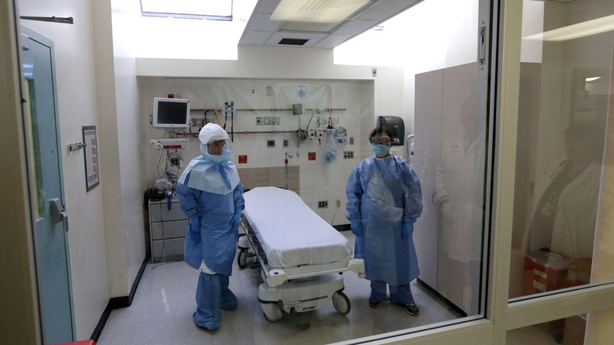World Bank chief Jim Yong Kim has made an impassioned plea for thousands of more medics to help fight the Ebola epidemic in west Africa, saying it was a global crisis that needed a global response.
Mr Kim also warned against knee-jerk panic in response to the highly contagious virus, which has killed nearly 5,000 people in the outbreak.
"This is not an African crisis ... it is a global crisis," said Mr Kim, who is visiting Ethiopia.
"We'll need a steady state of at least 5,000 health workers from outside the region ... those health workers cannot work continuously, there needs to be a rotation," he said.
"So we will need many thousands of health workers over the next months to a year to bring this epidemic under control."
The three worst-hit countries – Liberia, Sierra Leone and Guinea – are sorely lacking in medical infrastructure and funds due to a series of interlinked civil wars.
Liberia has been hardest hit by the outbreak, with 4,665 recorded cases and 2,705 deaths, according to the World Health Organization, relying on figures that are now ten days out-of-date.
Mr Kim said medics should remember their vocation and the Hippocratic oath and not shy away from going to a problem area.
"Right now, I'm very much worried about where we will find those health workers," he said.
"With the fear factor going out of control in so many places, I hope that government and health professionals will understand that when they took their oath in becoming a health care worker it was precisely for moments like this."

Meanwhile, federal health officials in the United States have revamped guidelines for doctors and nurses returning back to the US from treating Ebola patients in west Africa.
The measures stop well short of controversial mandatory quarantines being imposed by some US states.
Director of the US Centers for Disease Control and Prevention (CDC) Dr Thomas Frieden called for isolation of people at the highest risk for Ebola infection.
However, he said most medical workers returning from the three countries at the centre of the epidemic would require daily monitoring without isolation.
New York and New Jersey are among a handful of states to impose mandatory quarantines on returning doctors and nurses amid fears of the virus spreading outside of west Africa.
The Obama administration's new guidelines are not mandatory, and states will have the right to put in place policies that are more strict.
Some state officials, grappling with an unfamiliar public health threat, had called federal restrictions placed on people travelling from Ebola-affected countries insufficient to protect Americans and have imposed tougher measures.
With thousands already dead from Ebola in Liberia, Sierra Leone and Guinea, concerns are high in the US about stopping its spread.
The University of Maryland Medical Center in Baltimore said it was assessing a potential Ebola patient, who was in isolation.
The hospital, one of three designated Ebola treatment centres in the area, gave no further details.
Earlier in New York City, a five-year-old boy who arrived in the US from Guinea and was in hospital for screening for fever, tested negative for Ebola.
Dr Frieden, on a conference call with reporters, warned against turning doctors and nurses who are striving to tackle Ebola in west Africa before it spreads more widely, into "pariahs".
Under new CDC guidelines that spell out four risk categories, most healthcare workers returning from west Africa's Ebola hot zone would be considered to be at "some risk" for infection, while healthcare workers tending to Ebola patients at US facilities would be seen as "low but non-zero" risk.
The US military said it was isolating troops returning from their mission to help west African countries curb Ebola even though they showed no sign of infection.
And a nurse who treated patients in Sierra Leone was released to go to her home state of Maine after New Jersey had forced her into quarantine.
The nurse had been kept in quarantine for two days after testing negative for the Ebola virus.

